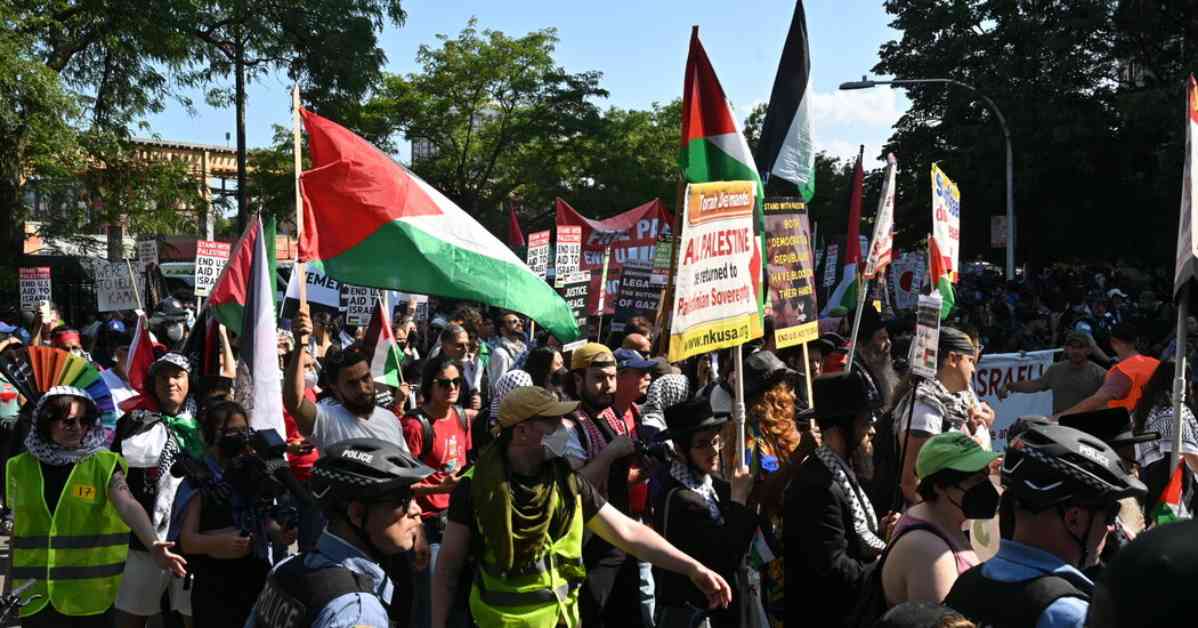Left-Wing Workers and Union Leaders Clash Over Gaza Conflict
The recent Democratic National Convention in Chicago has brought to the surface simmering tensions within the labor movement over the ongoing conflict in Gaza. Pro-Palestinian protesters took to the streets during the convention, highlighting the deep divisions among left-wing workers and union leaders on how to address the crisis.
Members of the Chicago Teachers Union who participated in the convention expressed frustration over the war in Gaza, arguing that the billions of dollars in aid to Israel could be better spent on students and humanitarian efforts. Additionally, they criticized their parent union, the American Federation of Teachers, for not taking a stronger stance against Israel’s military campaign.
Kirstin Roberts, a preschool teacher who attended the protest, voiced her disappointment with the resolution on Israel and Palestine adopted by the American Federation of Teachers. She emphasized the need for an end to armed shipments to Israel, a sentiment shared by many rank-and-file union members who have been critical of Israel’s actions in response to attacks by Hamas-led militants.
The reluctance of national union leaders to take a firm stand on the Gaza conflict has exacerbated tensions within the labor movement. While some leaders have emphasized the complexities of the situation and the role of Hamas in the escalation of violence, grassroots activists have called for a more unequivocal condemnation of Israel’s actions.
Randi Weingarten, the president of the American Federation of Teachers, defended the union’s resolution on Israel and Palestine, stating that careful consideration was given to the moral implications of the language used. However, this cautious approach has drawn criticism from those who believe that stronger action is needed to address the humanitarian crisis in Gaza.
Roots of the Conflict
The conflict in Gaza has deep historical roots, with both Israelis and Palestinians laying claim to the land and seeking to establish their own states. The ongoing violence has resulted in the loss of thousands of lives and significant destruction, further fueling tensions between the two sides.
The recent escalation of violence in Gaza was sparked by a series of attacks by Hamas-led militants, leading to a deadly response from the Israeli military. The cycle of violence has continued unabated, with both sides accusing each other of aggression and human rights violations.
The international community has called for a ceasefire and a peaceful resolution to the conflict, but the entrenched positions of both Israel and Hamas have made progress elusive. The humanitarian crisis in Gaza has only worsened, with millions of civilians caught in the crossfire and in need of urgent assistance.
Implications for the Labor Movement
The divisions within the labor movement over the Gaza conflict have significant implications for the future of worker solidarity and activism. As workers and union leaders grapple with how to address the crisis, the debate over Israel and Palestine is likely to continue shaping internal dynamics within labor organizations.
The clash between left-wing workers and union leaders reflects broader debates within society over the role of the United States in the Israeli-Palestinian conflict. While some advocate for a more assertive approach to holding Israel accountable for its actions, others emphasize the need for a nuanced understanding of the complexities of the situation.
The labor movement has a long history of advocating for social justice and human rights, making the debate over the Gaza conflict a crucial test of its commitment to these values. As workers push for a more proactive stance on international issues, union leaders will need to navigate the delicate balance between solidarity with workers and diplomatic considerations.
In conclusion, the clash between left-wing workers and union leaders over the Gaza conflict underscores the challenges of navigating complex international issues within the labor movement. As tensions continue to simmer, the need for dialogue and solidarity among workers becomes increasingly urgent to address the humanitarian crisis in Gaza and ensure a just resolution to the conflict.




















